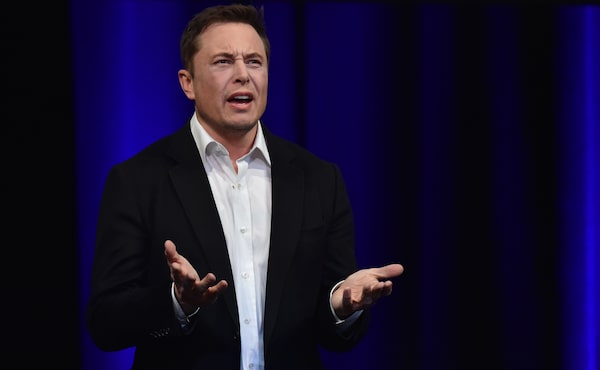
Elon Musk speaks at the 68th International Astronautical Congress 2017 in Adelaide on Sept. 29, 2017.PETER PARKS
Elon Musk is sounding more and more like Donald Trump. Both are thin-skinned, quick to lash out at skeptics and increasingly erratic.
In recent months, the Tesla Inc. founder has struggled to meet his self-imposed production targets, but managed to squeeze in time to lambaste analysts for their “boring, bonehead questions” and tweet abuse at a British cave diver involved in the soccer-team rescue in Thailand. Meanwhile, the U.S. President has filled his hours by launching a global trade war and insulting his closest allies at NATO while making kissy face with Vladimir Putin.
What’s behind these leaders’ odd, gratuitously abrasive behaviour? At least in part, it stems from our new enthusiasm for disrupters. Both voters and investors have become infatuated with strong personalities who claim they have a magic plan to overthrow existing elites and make the world better in the process. To a disrupter’s fans, aggression and confrontation aren’t flaws. They’re virtues.
Disruption’s growing appeal is on display in corporate reports. Top executives routinely claim they’re planning to disrupt their industries, while fighting off the potential for disruption from new rivals and eyeing the disruptive potential of the latest technology. Media organizations publish lists of the most disruptive companies – typically upstarts that have yet to go public, but have managed to excite venture capitalists. Meanwhile, management consultants have made a fetish of Mark Zuckerberg’s famous advice – “Move fast and break things” – and cite it as the authority for plunging headlong into whatever disruptive direction the consultant thinks is appropriate.
It all sounds terrifically heroic. Sadly, though, this disruption thing isn’t going quite as well as its proponents suggest.
Tesla, which was supposed to disrupt the auto industry, is still bleeding cash. Uber Technologies Inc., which aimed to disrupt the taxi industry, is also losing money and struggling to overcome the hostility generated by previous management. Theranos Inc., which claimed to be disrupting the diagnostic lab industry, has imploded after its top executives were charged with fraud.
In politics, too, the disrupters are having their issues. Remember Brexit, the wonderful solution that would see Britain regain control of its borders while allowing it to achieve unprecedented prosperity? It now seems the task of agreeing on an exit deal with the European Union is more complicated than the Leavers thought. The ruling Conservative Party is waging war with itself over the contours of an acceptable agreement, and Britain may wind up crashing out of the EU in March without a deal in place.
In the United States, the biggest disrupter of them all is also hitting some bumps. Back in March, before starting to impose tariffs, Mr. Trump tweeted that trade wars “are good and easy to win.” But Canada and other countries have fought back with retaliatory levies of their own, and most economists predict pain ahead for many U.S. industries. Meanwhile, Mr. Trump’s kowtowing before Mr. Putin has elicited howls of outrage even from within his own party.
If there’s an overarching lesson here, it’s that genuine disruption is hard, risky, unpredictable work. Maybe Mr. Trump, Mr. Musk and the Brexiters will eventually achieve their goals and create huge successes. But maybe not.
Investors, in particular, may want to be skeptical. The evidence suggests that many of the biggest winners in the market aren’t self-styled disrupters, which set out to revolutionize industries, but businesses that simply find smart ways to thrive within an existing sector. Everyone likes to point at great disrupters such as Google’s parent, Alphabet Inc., which has reshaped the face of online business since it went public in 2004. Far fewer people realize that Domino’s Pizza Inc., which went public the same year, has actually outperformed the search giant in total return for investors.
The idea that you can pick out great disrupters early on seems particularly far-fetched. A classic 2001 study by finance professors Louis Chan, Jason Karceski and Josef Lakonishok found there is no persistence in a stock’s long-term earnings growth beyond what you expect from chance. Today’s fast-growing company is just as likely to wind up as a dud as it is to continue shooting to the moon, according to their research.
To be sure, the success of the FAANG stocks in recent years has convinced many investors that growth is predictable. Similarly, the success of the Leave option in Britain, of Mr. Trump in the U.S. presidential election, and of politicians such as Rob Ford in Ontario, has persuaded many people that only leaders who offer disruption can win. But if the recent hissy fits by Mr. Musk and Mr. Trump demonstrate anything, it’s that successful disruption is a lot harder than it looks.
 Ian McGugan
Ian McGugan